Unit 9 Have you ever been to a museum? 单元知识点复习课件(共20张PPT)
文档属性
| 名称 | Unit 9 Have you ever been to a museum? 单元知识点复习课件(共20张PPT) | 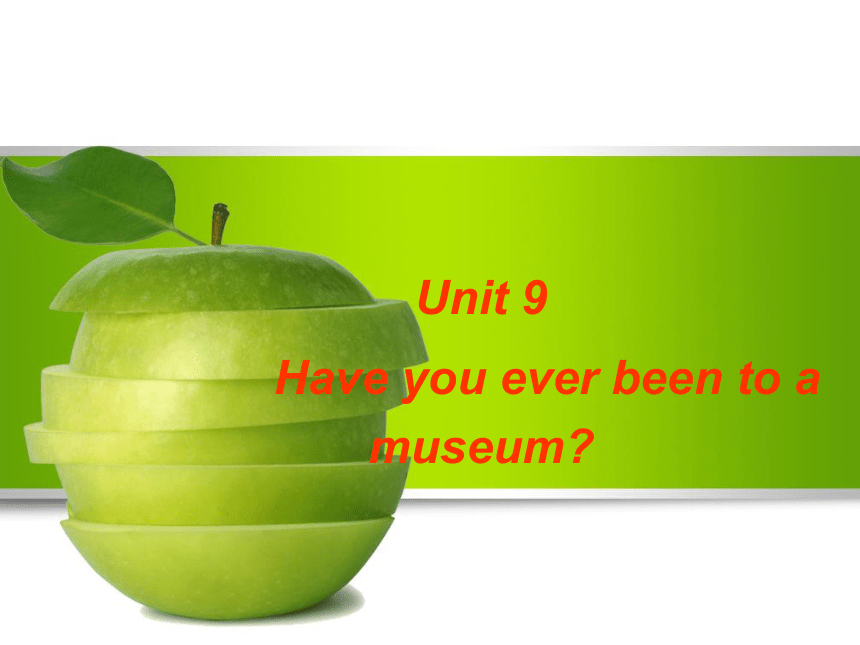 | |
| 格式 | zip | ||
| 文件大小 | 468.5KB | ||
| 资源类型 | 教案 | ||
| 版本资源 | 人教新目标(Go for it)版 | ||
| 科目 | 英语 | ||
| 更新时间 | 2020-06-15 19:57:43 | ||
图片预览

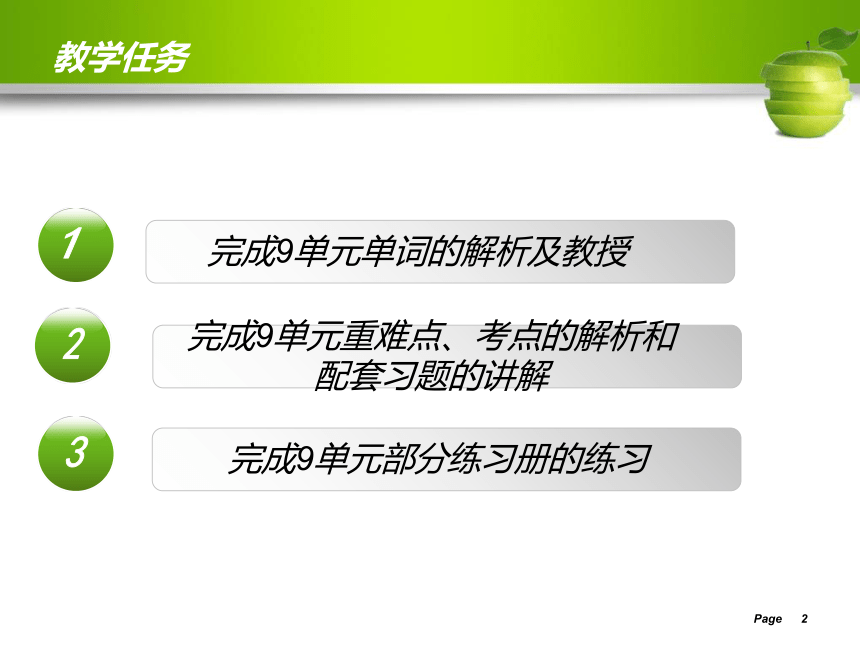
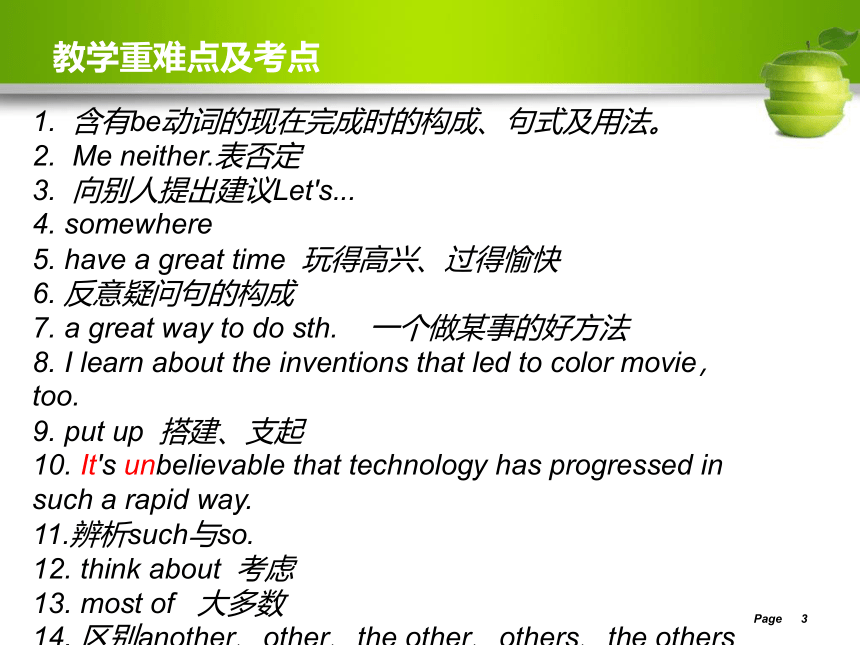
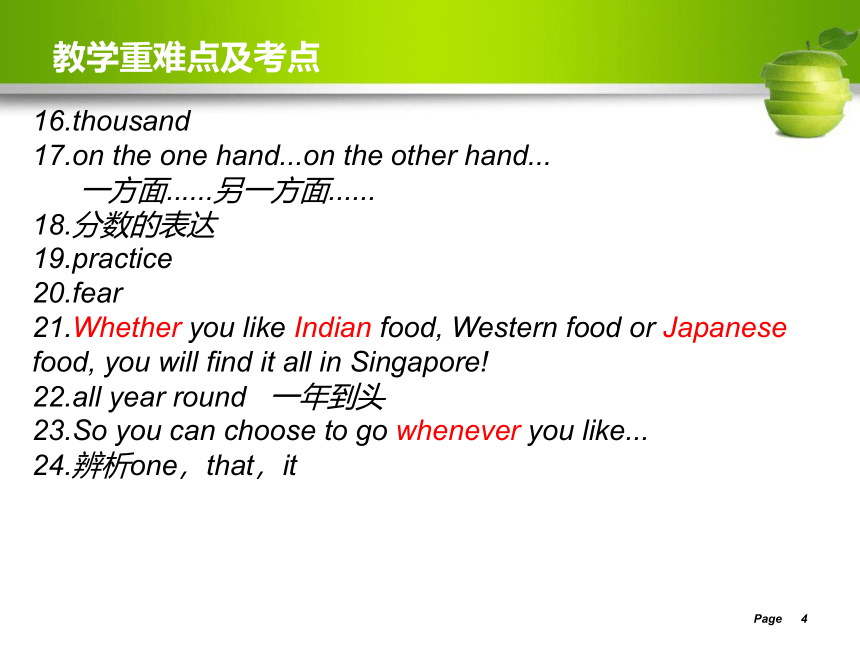
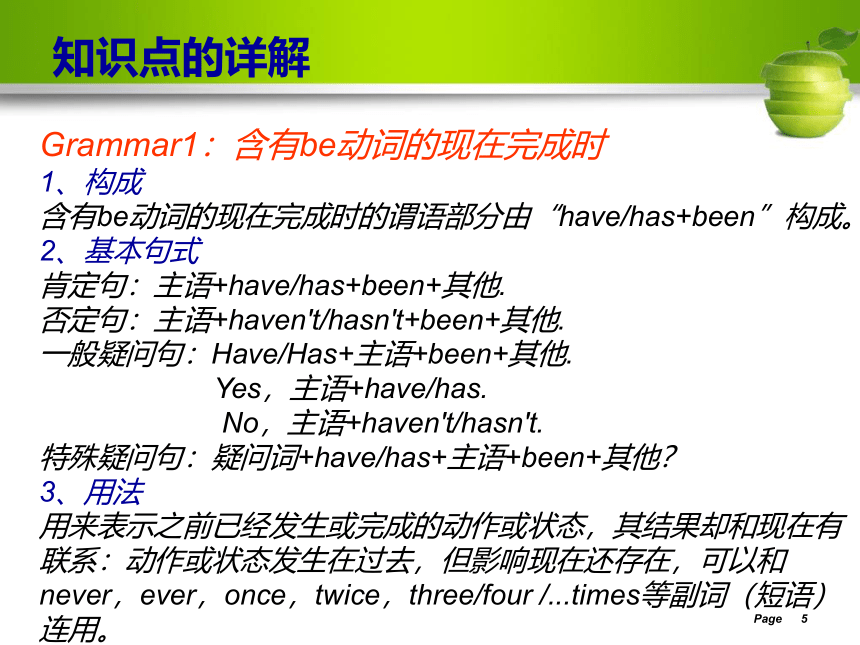
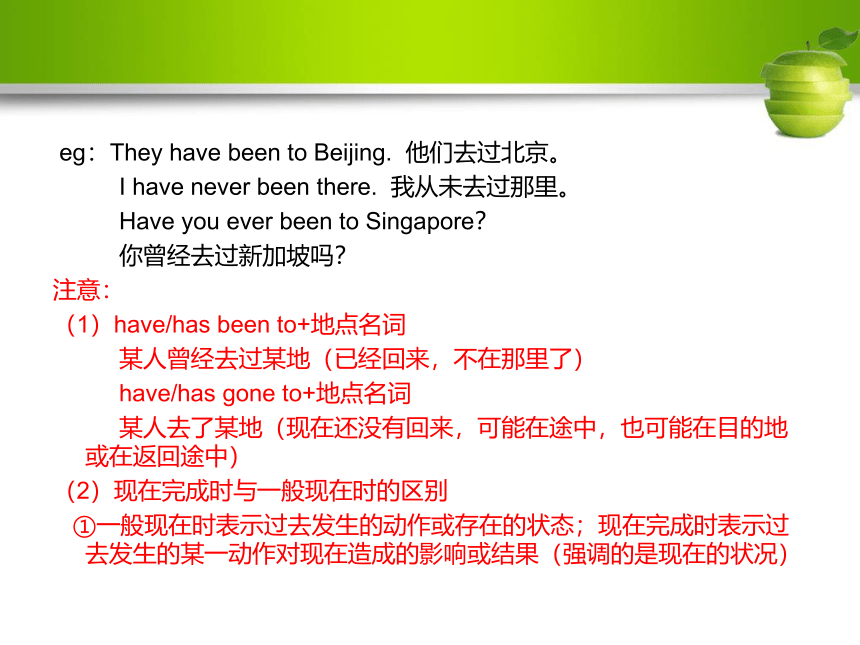
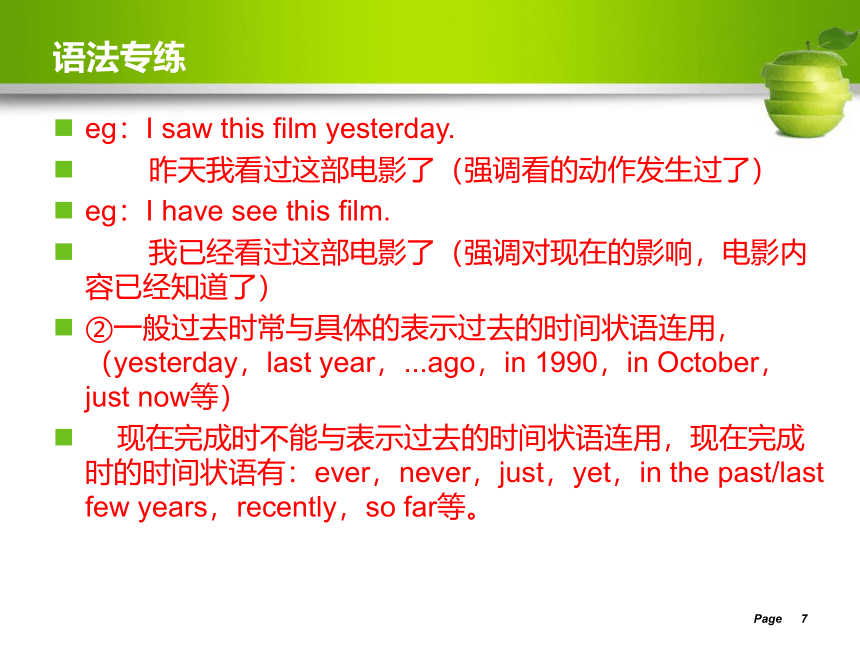
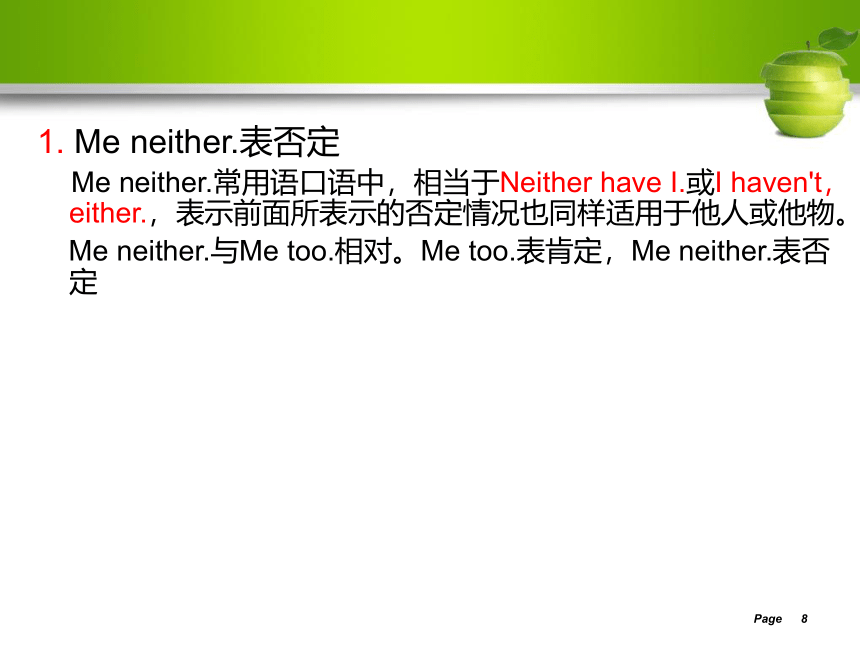
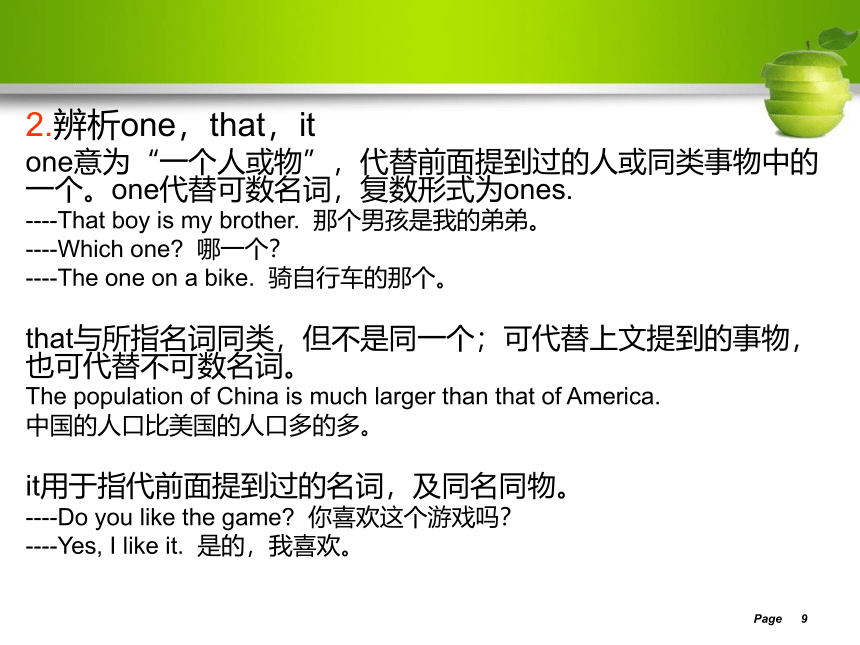
文档简介
(共20张PPT)
Unit
9
Have
you
ever
been
to
a
museum?
Page
?
教学任务
完成9单元单词的解析及教授
完成9单元重难点、考点的解析和配套习题的讲解
完成9单元部分练习册的练习
教学任务
Page
?
教学重难点及考点
1.
含有be动词的现在完成时的构成、句式及用法。
2.
Me
neither.表否定
3.
向别人提出建议Let's...
4.
somewhere
5.
have
a
great
time
玩得高兴、过得愉快
6.
反意疑问句的构成
7.
a
great
way
to
do
sth.
一个做某事的好方法
8.
I
learn
about
the
inventions
that
led
to
color
movie,too.
9.
put
up
搭建、支起
10.
It's
unbelievable
that
technology
has
progressed
in
such
a
rapid
way.
11.辨析such与so.
12.
think
about
考虑
13.
most
of
大多数
14.
区别another、other、the
other、others、the
others
Page
?
教学重难点及考点
16.thousand
17.on
the
one
hand...on
the
other
hand...
一方面......另一方面......
18.分数的表达
19.practice
20.fear
21.Whether
you
like
Indian
food,
Western
food
or
Japanese
food,
you
will
find
it
all
in
Singapore!
22.all
year
round
一年到头
23.So
you
can
choose
to
go
whenever
you
like...
24.辨析one,that,it
Page
?
知识点的详解
Grammar1:含有be动词的现在完成时
1、构成
含有be动词的现在完成时的谓语部分由“have/has+been”构成。
2、基本句式
肯定句:主语+have/has+been+其他.
否定句:主语+haven't/hasn't+been+其他.
一般疑问句:Have/Has+主语+been+其他.
Yes,主语+have/has.
No,主语+haven't/hasn't.
特殊疑问句:疑问词+have/has+主语+been+其他?
3、用法
用来表示之前已经发生或完成的动作或状态,其结果却和现在有联系:动作或状态发生在过去,但影响现在还存在,可以和never,ever,once,twice,three/four
/...times等副词(短语)连用。
eg:They
have
been
to
Beijing.
他们去过北京。
I
have
never
been
there.
我从未去过那里。
Have
you
ever
been
to
Singapore?
你曾经去过新加坡吗?
注意:
(1)have/has
been
to+地点名词
某人曾经去过某地(已经回来,不在那里了)
have/has
gone
to+地点名词
某人去了某地(现在还没有回来,可能在途中,也可能在目的地或在返回途中)
(2)现在完成时与一般现在时的区别
①一般现在时表示过去发生的动作或存在的状态;现在完成时表示过去发生的某一动作对现在造成的影响或结果(强调的是现在的状况)
Page
?
语法专练
eg:I
saw
this
film
yesterday.
昨天我看过这部电影了(强调看的动作发生过了)
eg:I
have
see
this
film.
我已经看过这部电影了(强调对现在的影响,电影内容已经知道了)
②一般过去时常与具体的表示过去的时间状语连用,(yesterday,last
year,...ago,in
1990,in
October,just
now等)
现在完成时不能与表示过去的时间状语连用,现在完成时的时间状语有:ever,never,just,yet,in
the
past/last
few
years,recently,so
far等。
Page
?
1.
Me
neither.表否定
Me
neither.常用语口语中,相当于Neither
have
I.或I
haven't,either.,表示前面所表示的否定情况也同样适用于他人或他物。
Me
neither.与Me
too.相对。Me
too.表肯定,Me
neither.表否定
Page
?
2.辨析one,that,it
one意为“一个人或物”,代替前面提到过的人或同类事物中的一个。one代替可数名词,复数形式为ones.
----That
boy
is
my
brother.
那个男孩是我的弟弟。
----Which
one?
哪一个?
----The
one
on
a
bike.
骑自行车的那个。
that与所指名词同类,但不是同一个;可代替上文提到的事物,也可代替不可数名词。
The
population
of
China
is
much
larger
than
that
of
America.
中国的人口比美国的人口多的多。
it用于指代前面提到过的名词,及同名同物。
----Do
you
like
the
game?
你喜欢这个游戏吗?
----Yes,
I
like
it.
是的,我喜欢。
Page
?
3.somewhere
somewhere作副词,意为“在某处,在某地”,通常用于肯定句中,在肯定句或疑问句中要用anywhere。
注意:形容词修饰somewhere,anywhere,nowhere等时,形容词后置。
4.反意疑问句的构成
It's
really
interesting,isn't
it?
构成:陈述句+简短问句(常译为“是不是?/不是吗?/是吧?/对吗?等”)
注意:(1)反意疑问句遵循“前肯后否,前否后肯”的原则。即陈述句部分为肯定时,疑问句部分为否定;陈述句部分为为否定时,疑问句部分为肯定。
eg:He
is
a
driver,
isn't
he?
他是一名司机,是不是?
Your
elder
sister
didn't
help
him,
did
she?
你姐姐没有帮助他,是吗?
(2)当前面的陈述句有否定词few,little,never,no,nobody,hardly,seldom等词时,其后的疑问句部分应用肯定形式。
eg:He
can
hardly
swim,
can
he?
他几乎不会游泳,是吗?
We
have
little
water,
do
we?
我们几乎没有水了,对吗?
(3)以let's开头的反意疑问句,反意疑问部分用shall
we;
以let
us开头的反意疑问句,反意疑问部分用will
you.
5.a
great
way
to
do
sth.
一个做某事的好方法
a
great
way
to
do
sth.=a
great
way
of
doing
sth.
6.It's
unbelievable
that
technology
has
progressed
in
such
a
rapid
way.
本句是一个含有主语从句的主从复合句,it在句中作形式主语,that引导的从句是真正的主语。
形容词否定前缀un
un+形容词=否定意义的形容词
know(出名的)-----unknow(无名的)
tidy(整洁的)-----untidy(凌乱的)
kind(和善的)-----unkind(不客气的)
happy(高兴的)------unhappy(不高兴的)
7.辨析such与so.
such
adj.
such+a/an+形容词+可数名词单数
such+形容词+可数名词复数/不可数名词
eg:I
have
such
good
books
to
read.
我有这么好的书可读。
so
adv.
so+形容词/副词
eg:He
runs
so
fast.
他跑得如此快。
so+形容词+a/an+可数名词单数
so+many/much/little/few(少)+名词
eg:He
is
such
a
great
writer.=He
is
great
a
writer.
他是一位如此伟大的作家。
8.encourage
鼓励
encourage
sb.
to
do
sth.
鼓励某人做某事
9.most
of
大多数
修饰的名词作主语时,谓语动词的单复数形式取决于most
of修饰的是可数名词还是不可数名词。
9.区别another、other、the
other、others、the
others
another三者或三者以上中的任何一个,后常接单数名词;也可作代词
other只作定语,常与复数名词连用
the
other表示两者中的另一个,是特指,常用语结构“one...the
other...”中,意为“一个...另一个...”;其后可接数词或复数名词,特指“其他的”
others用作代词,泛着其他的人或物,some...others...意为“有的......,有的......”
the
others特指在一个整体中的其他的人或物,相当于the
other+复数名词
Section
B
10.on
the
one
hand...on
the
other
hand...
一方面......另一方面......
其中on
the
one
hand中的the也可以省掉
11.分数的表达
分子用基数词,分母用序数词,当分子大于1时,分母用复数形式
three
quarters
a
quarter
a
half
two
thirds
四分之三
四分之一
二分之一
三分之二
12.Whether
you
like
Indian
food,
Western
food
or
Japanese
food,
you
will
find
it
all
in
Singapore!
whether连词,意为“不管......(还是);或者......(或者)”,引入选择的可能性,引导的句子通常做状语。
Indian此处用作形容词,意为“印度的”其名词形式为India(印度)。Indian还可做名词,意为“印度人”
在英语中,一些表示国家或地区的名词,可加后缀-(a)n,构成形容词,意为“......(人)的”
America-----American
Australia-----Australian
Europe-----European
Africa-----African
China---Chinese
Japan-----Japanese
13.all
year
round
一年到头
同义短语:all
the
year
14.So
you
can
choose
to
go
whenever
you
like...
whenever连词,意为“无论何时;在任何......的时候”,与no
matter
when同义。
【拓展】
whatever------no
matter
what
无论什么
however------no
matter
how
不管怎样
wherever------no
matter
where
无论哪里
Homework
Page
?
Unit
9
Have
you
ever
been
to
a
museum?
Page
?
教学任务
完成9单元单词的解析及教授
完成9单元重难点、考点的解析和配套习题的讲解
完成9单元部分练习册的练习
教学任务
Page
?
教学重难点及考点
1.
含有be动词的现在完成时的构成、句式及用法。
2.
Me
neither.表否定
3.
向别人提出建议Let's...
4.
somewhere
5.
have
a
great
time
玩得高兴、过得愉快
6.
反意疑问句的构成
7.
a
great
way
to
do
sth.
一个做某事的好方法
8.
I
learn
about
the
inventions
that
led
to
color
movie,too.
9.
put
up
搭建、支起
10.
It's
unbelievable
that
technology
has
progressed
in
such
a
rapid
way.
11.辨析such与so.
12.
think
about
考虑
13.
most
of
大多数
14.
区别another、other、the
other、others、the
others
Page
?
教学重难点及考点
16.thousand
17.on
the
one
hand...on
the
other
hand...
一方面......另一方面......
18.分数的表达
19.practice
20.fear
21.Whether
you
like
Indian
food,
Western
food
or
Japanese
food,
you
will
find
it
all
in
Singapore!
22.all
year
round
一年到头
23.So
you
can
choose
to
go
whenever
you
like...
24.辨析one,that,it
Page
?
知识点的详解
Grammar1:含有be动词的现在完成时
1、构成
含有be动词的现在完成时的谓语部分由“have/has+been”构成。
2、基本句式
肯定句:主语+have/has+been+其他.
否定句:主语+haven't/hasn't+been+其他.
一般疑问句:Have/Has+主语+been+其他.
Yes,主语+have/has.
No,主语+haven't/hasn't.
特殊疑问句:疑问词+have/has+主语+been+其他?
3、用法
用来表示之前已经发生或完成的动作或状态,其结果却和现在有联系:动作或状态发生在过去,但影响现在还存在,可以和never,ever,once,twice,three/four
/...times等副词(短语)连用。
eg:They
have
been
to
Beijing.
他们去过北京。
I
have
never
been
there.
我从未去过那里。
Have
you
ever
been
to
Singapore?
你曾经去过新加坡吗?
注意:
(1)have/has
been
to+地点名词
某人曾经去过某地(已经回来,不在那里了)
have/has
gone
to+地点名词
某人去了某地(现在还没有回来,可能在途中,也可能在目的地或在返回途中)
(2)现在完成时与一般现在时的区别
①一般现在时表示过去发生的动作或存在的状态;现在完成时表示过去发生的某一动作对现在造成的影响或结果(强调的是现在的状况)
Page
?
语法专练
eg:I
saw
this
film
yesterday.
昨天我看过这部电影了(强调看的动作发生过了)
eg:I
have
see
this
film.
我已经看过这部电影了(强调对现在的影响,电影内容已经知道了)
②一般过去时常与具体的表示过去的时间状语连用,(yesterday,last
year,...ago,in
1990,in
October,just
now等)
现在完成时不能与表示过去的时间状语连用,现在完成时的时间状语有:ever,never,just,yet,in
the
past/last
few
years,recently,so
far等。
Page
?
1.
Me
neither.表否定
Me
neither.常用语口语中,相当于Neither
have
I.或I
haven't,either.,表示前面所表示的否定情况也同样适用于他人或他物。
Me
neither.与Me
too.相对。Me
too.表肯定,Me
neither.表否定
Page
?
2.辨析one,that,it
one意为“一个人或物”,代替前面提到过的人或同类事物中的一个。one代替可数名词,复数形式为ones.
----That
boy
is
my
brother.
那个男孩是我的弟弟。
----Which
one?
哪一个?
----The
one
on
a
bike.
骑自行车的那个。
that与所指名词同类,但不是同一个;可代替上文提到的事物,也可代替不可数名词。
The
population
of
China
is
much
larger
than
that
of
America.
中国的人口比美国的人口多的多。
it用于指代前面提到过的名词,及同名同物。
----Do
you
like
the
game?
你喜欢这个游戏吗?
----Yes,
I
like
it.
是的,我喜欢。
Page
?
3.somewhere
somewhere作副词,意为“在某处,在某地”,通常用于肯定句中,在肯定句或疑问句中要用anywhere。
注意:形容词修饰somewhere,anywhere,nowhere等时,形容词后置。
4.反意疑问句的构成
It's
really
interesting,isn't
it?
构成:陈述句+简短问句(常译为“是不是?/不是吗?/是吧?/对吗?等”)
注意:(1)反意疑问句遵循“前肯后否,前否后肯”的原则。即陈述句部分为肯定时,疑问句部分为否定;陈述句部分为为否定时,疑问句部分为肯定。
eg:He
is
a
driver,
isn't
he?
他是一名司机,是不是?
Your
elder
sister
didn't
help
him,
did
she?
你姐姐没有帮助他,是吗?
(2)当前面的陈述句有否定词few,little,never,no,nobody,hardly,seldom等词时,其后的疑问句部分应用肯定形式。
eg:He
can
hardly
swim,
can
he?
他几乎不会游泳,是吗?
We
have
little
water,
do
we?
我们几乎没有水了,对吗?
(3)以let's开头的反意疑问句,反意疑问部分用shall
we;
以let
us开头的反意疑问句,反意疑问部分用will
you.
5.a
great
way
to
do
sth.
一个做某事的好方法
a
great
way
to
do
sth.=a
great
way
of
doing
sth.
6.It's
unbelievable
that
technology
has
progressed
in
such
a
rapid
way.
本句是一个含有主语从句的主从复合句,it在句中作形式主语,that引导的从句是真正的主语。
形容词否定前缀un
un+形容词=否定意义的形容词
know(出名的)-----unknow(无名的)
tidy(整洁的)-----untidy(凌乱的)
kind(和善的)-----unkind(不客气的)
happy(高兴的)------unhappy(不高兴的)
7.辨析such与so.
such
adj.
such+a/an+形容词+可数名词单数
such+形容词+可数名词复数/不可数名词
eg:I
have
such
good
books
to
read.
我有这么好的书可读。
so
adv.
so+形容词/副词
eg:He
runs
so
fast.
他跑得如此快。
so+形容词+a/an+可数名词单数
so+many/much/little/few(少)+名词
eg:He
is
such
a
great
writer.=He
is
great
a
writer.
他是一位如此伟大的作家。
8.encourage
鼓励
encourage
sb.
to
do
sth.
鼓励某人做某事
9.most
of
大多数
修饰的名词作主语时,谓语动词的单复数形式取决于most
of修饰的是可数名词还是不可数名词。
9.区别another、other、the
other、others、the
others
another三者或三者以上中的任何一个,后常接单数名词;也可作代词
other只作定语,常与复数名词连用
the
other表示两者中的另一个,是特指,常用语结构“one...the
other...”中,意为“一个...另一个...”;其后可接数词或复数名词,特指“其他的”
others用作代词,泛着其他的人或物,some...others...意为“有的......,有的......”
the
others特指在一个整体中的其他的人或物,相当于the
other+复数名词
Section
B
10.on
the
one
hand...on
the
other
hand...
一方面......另一方面......
其中on
the
one
hand中的the也可以省掉
11.分数的表达
分子用基数词,分母用序数词,当分子大于1时,分母用复数形式
three
quarters
a
quarter
a
half
two
thirds
四分之三
四分之一
二分之一
三分之二
12.Whether
you
like
Indian
food,
Western
food
or
Japanese
food,
you
will
find
it
all
in
Singapore!
whether连词,意为“不管......(还是);或者......(或者)”,引入选择的可能性,引导的句子通常做状语。
Indian此处用作形容词,意为“印度的”其名词形式为India(印度)。Indian还可做名词,意为“印度人”
在英语中,一些表示国家或地区的名词,可加后缀-(a)n,构成形容词,意为“......(人)的”
America-----American
Australia-----Australian
Europe-----European
Africa-----African
China---Chinese
Japan-----Japanese
13.all
year
round
一年到头
同义短语:all
the
year
14.So
you
can
choose
to
go
whenever
you
like...
whenever连词,意为“无论何时;在任何......的时候”,与no
matter
when同义。
【拓展】
whatever------no
matter
what
无论什么
however------no
matter
how
不管怎样
wherever------no
matter
where
无论哪里
Homework
Page
?
同课章节目录
- Unit 1 What's the matter?
- Section A
- Section B
- Unit 2 I'll help to clean up the city parks.
- Section A
- Section B
- Unit 3 Could you please clean your room?
- Section A
- Section B
- Unit 4 Why don't you talk to your parents?
- Section A
- Section B
- Unit 5 What were you doing when the rainstorm came
- Section A
- Section B
- Review of Units 1-5
- Unit 6 An old man tried to move the mountains.
- Section A
- Section B
- Unit 7 What's the highest mountain in the world?
- Section A
- Section B
- Unit 8 Have you read Treasure Island yet?
- Section A
- Section B
- Unit 9 Have you ever been to a museum?
- Section A
- Section B
- Unit 10 I've had this bike for three years.
- Section A
- Section B
